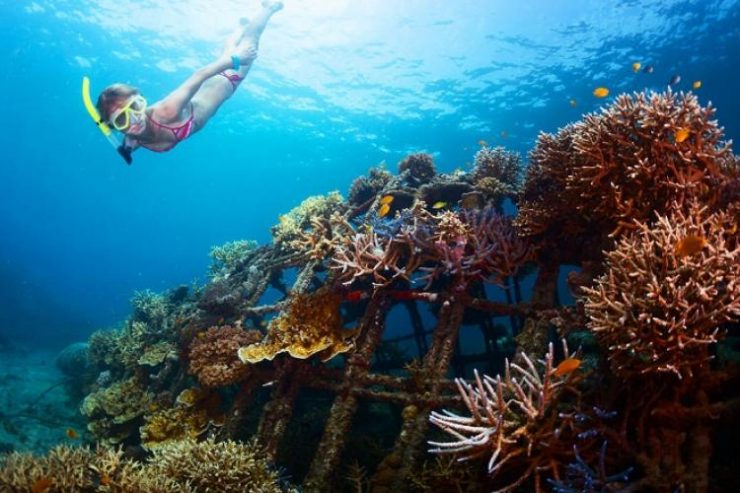THE coral reef restoration intiative in Pemuteran Village, Buleleng Regency in the northern part of Bali got its start literally from a dream. Veteran tour guide I Gusti Agung Prana, in his quest of finding a tourism destination that could delight the traveller and yet fulfill the needs of the local population, was brought to what is now Pemuteran Village through a dream he had nearly 20 years ago.
For a Balinese like Agung Prana, dreams like this are considered a guidance by the gods. In it he saw himself as helping the thousands of citizens of Pemuteran improve their welfare by finding wealth in the sea. Acting on this dream, he went to Pemuteran and found a hamlet devoid of proper housing. Instead there were makeshift huts scattered all over the village. Roads, electricity, running water and telephones were non-existent.
Poverty in Pemuteran was pervasive while the environment was in ruins. Agung Prana found the villagers to be poor, hopeless and hostile. They mostly subsisted on fishing which they practiced in a destructive way. Use of homemade bombs and potassium cyanide to boost their daily catch was common. When Agung Prana reminded them that this was destructive and unsustainable, he was met with open hostility.
In order to persuade the villagers, Agung used a cultural-spiritual approach by asking the villagers to pray together for a better life. Through persistence and patience he managed to convince them to abandon their destructive fishing methods, to clean up the village grounds and beaches and to have hope. At his own personal cost in 1989 he rented ten busses to bring the villagers to south Bali where the tourism industry flourished. Agung promised that Pemuteran can be an attractive tourist destination like south Bali minus the excesses.
Through Yayasan Karang Lestari (Coral Restoration Foundation) Agung initiated training programs, short courses and volunteer programs in relevant fields like: (a) responsible fishing, (b) guest service, (c) coral reef rehabilitation, (d) hospitality skills and motivation. The ultimate objective (vision) of the YKL is “To make Pemuteran the Destination of Choice in Bali for Eco-friendly Marine Tourism.”
The objectives of YKL are: (1) Through Gotong Royong (mutual self-help) to rehabilitate and nurture coral reefs in Pemuteran Bay and beyond, (2) Instill a sense of ownership amongst villagers towards the environment ensuring a cleaner, healthier village, (3) Improve their welfare and spiritual well-being, (4) adopt apropriate technology for rehabilitation and preservation of coral reefs in the area.
These objectives are then broken down into specific programs and initiatives which are operational because they are the result of village consensus (Prarem) that are incorporated into the village law (Aweg-Aweg) and are enforced by the traditional policing force (Pecalang). Most prominent among them is: (a) The ban on bombs and potassium for fishing and for taking coral reefs.
Other steps include: (b) Prohibiting sellers/hawkers from pestering visitors with their wares, (c) Facilitating locals to open up new tourism-related businesses and providing necessary training and capacity building, (d) Utilizing (in 2001) Bio-rock Technology developed by marine biologists and engineers Wolf Gilbert and Tom Gureau.
Bio-Rock Technology
Bio-rock technique has been tried in several other places but have always failed. It succeeded in Bali (Pemuteran Village) because of one crucial element: community participation. The method involves giving newly formed corals minuscule electical currents that speeds up growth. The growth rate can be as high as six times normal growth. The corals are more resistent towards water temperature changes, climate variances, and even contamination from polluted water.
Today Pemuteran Village is a vibrant and growing community with nearly 75 bungalows/homestays, 20 hotels/resorts, 9 luxury villas, 30 restorants, cafes, or traditional warungs (roadside food stalls), and 12 spas and/or salons. Of the working age population, around 2000 are employed within the tourism and hospitality sector. Pemuteran has truly become a destination of choice for eco-friendly marine tourism in Bali. And it remains one of the few places on the island where visitors and tourists (foreign and domestic) are not pestered by sellers and hawkers. [tito soejarman/er/photo special]
















